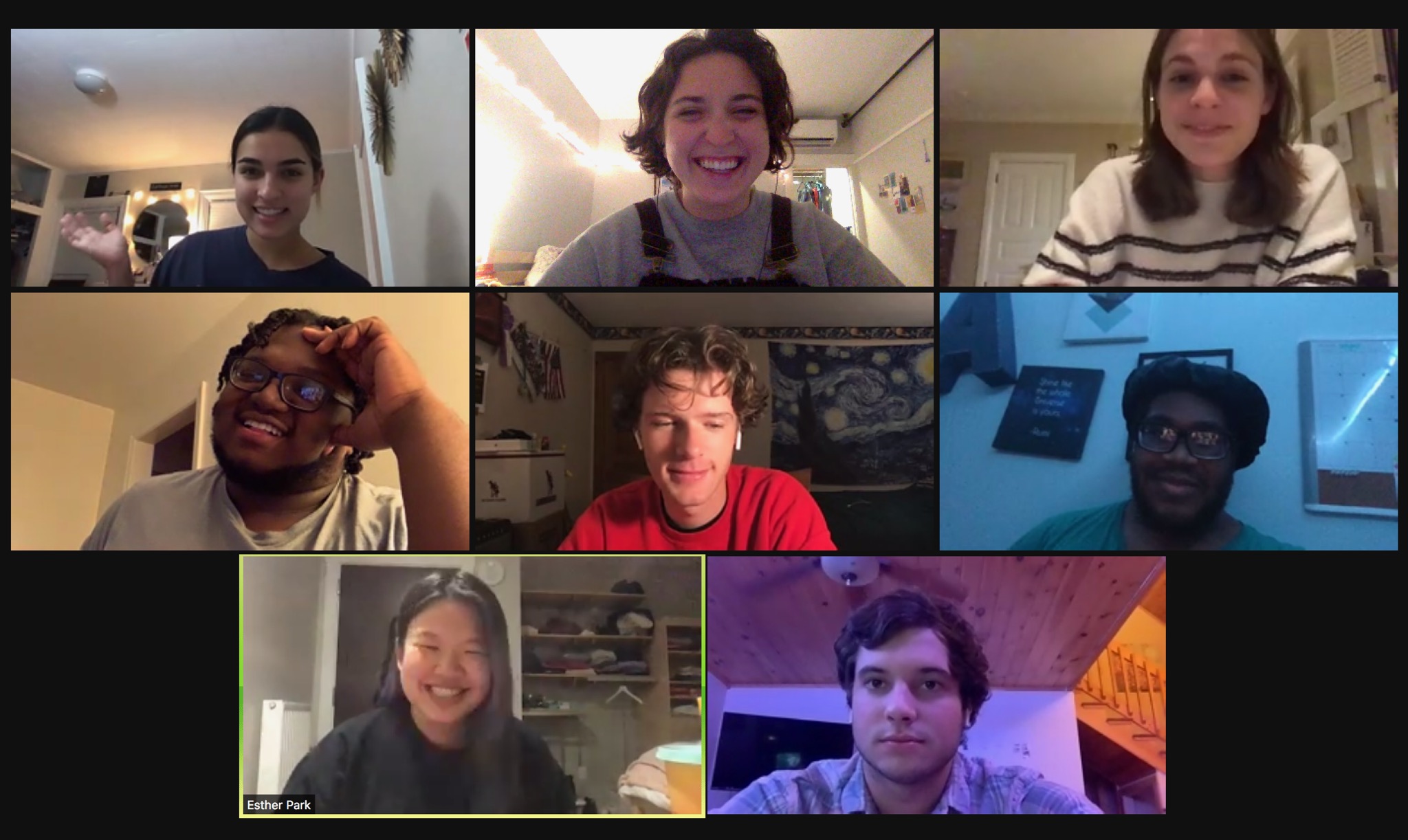Singing over Zoom: a cappella auditions go virtual
October 23, 2020
 Courtesy of Gillian Raley
Courtesy of Gillian RaleyIn a normal academic year, Bowdoin’s six a cappella groups would have finished recruitment several weeks ago. The week-long process, which typically takes place in late September, consists of a first round of auditions, a second round of callbacks and the “draft,” where the A Cappella Council meets to express interest in singers and then issue bids to them. However, due to social distancing restrictions on campus, the audition process is unfolding differently than previous years—not only is it happening a month later, but some groups are not holding auditions at all.
This year, only three groups—BOKA, Bear Tones and the Longfellows—have held auditions. Amanda Anderson ’21, one of the leaders of BOKA, is enthusiastic about holding auditions despite the distance.
“[BOKA] really values our friendships within the group,” said Anderson in a Zoom interview with the Orient. “We obviously love singing and love putting on a good performance, but it’s the friendships that kind of come first for us, so we were really pushing to keep recruiting.”
Over the past week, BOKA has asked interested singers to submit a video of them performing any song. If a singer is called back, they will meet synchronously with the group over Zoom to perform vocal exercises, learn part of a song in BOKA’s repertoire and sing another song of their choosing.
“It’s obviously been a really important part of everyone’s time at Bowdoin to be a part of the a cappella group,” said Anderson. “We’ve been trying to figure out ways to be able to spread that to the [first years] since they are having a pretty hard time trying to navigate Bowdoin online.”
The members of Bear Tones, who are conducting auditions in a similar fashion to BOKA, also believe that there is potential for remote recruitment.
“I don’t personally see a huge difference between this year and other years,” said Jaya Blanchard ’21, a member of Bear Tones, in a phone interview with the Orient. “I think there is a way to give first years the full, integrated experience of being in a group if everyone is willing to put in the effort.”
After recruitment is finished, Blanchard and the rest of Bear Tones will focus their efforts on integrating new members into the group and cultivating a welcoming environment for the duration of remote learning.
“It’s important that the person feels like they fit into the group,” said Blanchard. “Our hope is just to try to do that the best we can.”
The Longfellows are also enthusiastic about recruiting new members, but they anticipate challenges when it comes to cultivating a musical community online.
“As a leader of the Longfellows, I thought it would be negligent not to recruit, but it’s really hard to promise a community to first years,” said Benjamin Zevallos ’21, musical director of the Longfellows, in a Zoom interview with the Orient.
While three groups have spent the last week recruiting, the other three groups—the Meddiebempsters, Miscellanea and Ursus Verses—made the conscious decision not to hold auditions. This decision did not come easily, but the groups concluded that virtual auditions would not provide them with enough information to be able to accept new members.
“We’re really dependent on meeting people in person and hearing them as they sound in a group context, not just individual voices,” said Jack Burnett ’21, the business director of the Meddiebempsters, in a phone interview with the Orient.
For the Meddiebempsters, the decision not to hold auditions has also allowed them to focus on supporting the other current members of the group during this unprecedented semester.
“We’re making sure we’re all a big support network for each other when we’re on campus, and making sure that we continue to be that support network for each other when we’re off campus,” said Burnett. “It has been more inward-facing in that regard.”
Hope Keeley ’21, a member of Ursus Verses, believes that there were too many obstacles in the way for the group to go through with recruitment this semester.
“You want your group to get bigger and you want to maintain your presence on campus…but we thought that there were other ways outside of strict recruitment and strict audition processes to get to know and reach out to new students and new people interested in a capella,” said Keeley in a phone interview with the Orient.
Miscellania also decided not to hold auditions this year as they felt confident enough in the size of their group to wait until 2021 to begin recruiting again.
“We would just need to recruit double for the fall of next year, which hopefully wouldn’t be too big of an issue,” said Ayana Harscoet ’21, a senior member of Miscellania, in a Zoom interview with the Orient. “Right now we’re pretty fortunate to have a pretty full group.”
However, Miscellania still hopes to serve the College’s musical community through a workshop program.
“We’re starting these workshops soon to give the fundamentals of a cappella, like “beat-boxing 101” and “how to arrange music”—whatever [the community is] interested in,” said Harscoet.
Whether or not they are holding auditions, all the groups are also encouraging students who are interested in singing a cappella at Bowdoin to engage by reading more about each group, both on CampusGroups and on their various social media platforms.
“Don’t hesitate to reach out to any of the groups,” said Keeley. “Look for our web presences and see what each group is about!”
Jane Godiner is a member of BOKA.

Comments
Before submitting a comment, please review our comment policy. Some key points from the policy: